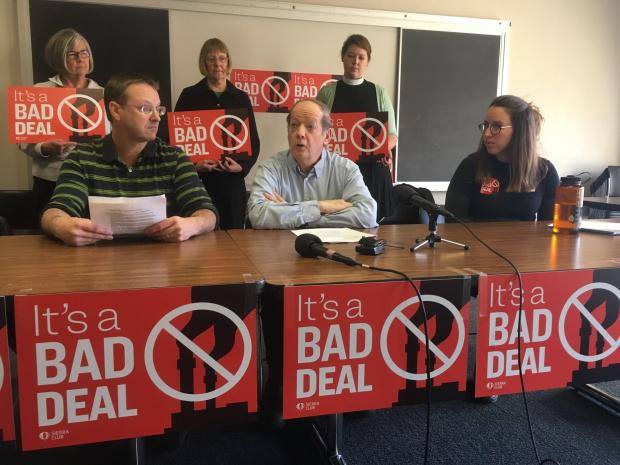
Fracked gas (commonly known as natural gas) has become a popular “clean” energy source in the United States. Some proudly define fracked gas as a “bridge fuel” to lower CO2 emitting energy sources. However, fracked gas is not a clean energy source and has generational impacts on the United States and Wisconsin. Since 2018, Dairyland Power Cooperative and Minnesota Power have been pursuing the construction of a fracked gas power plant in Superior, Wisconsin, which puts a community and their access to clean water at risk.
First, the process of obtaining fracked gas is extremely water-intensive. Generally, 2 to 8 million gallons of fracking fluid (water mixed with shale and brine) are used to extract gas from a well. Since fracking fluid is not regulated, impurities end up in groundwater wells and inland streams. Most fracked gas companies either dispose of used fracking fluid in disposal wells or recycle it for use in future fracking. Disposal wells are the cause of most of the earthquakes related to gas and oil development, because if pressurized water gets into an existing fault line, it can cause an earthquake.
After gas is fracked, power plants use gas combustion turbines to generate electricity, and then use the waste heat to create more power in a steam turbine. Although the overall combined cycle system requires much less water cooling than traditional steam turbine power plants, around 400 million gallons of water are used per day for further refining.
Another significant danger to clean water in Wisconsin is the uncombusted fracked gas. Uncombusted fracked gas is comprised mostly of methane, a greenhouse gas far more potent than CO2. When methane leaks into the air before being used, it absorbs the sun’s heat, warming the atmosphere at a higher rate than CO2. Increased heat influencing global warming in Wisconsin will cause increased severe storms, and lower water levels in the Great Lakes, inland lakes, and streams. This will change agriculture landscapes, affecting our industry and economy as well. Methane is also a health hazard when ingested (primarily through water).
In Superior, Wisconsin Dairyland Power Cooperative and Minnesota Power are planning to build the Nemadji Trail Energy Center, a fracked gas power plant next to the Nemadji River. Last year, Minnesota approved the certificate of need and denied an environmental review for the project. This October, Wisconsin will decide whether to allow the construction of the fracked gas power plant.
Approving the power plant would have a direct, negative impact on the environment. Through the destruction of surrounding wetlands and overuse of an aquifer that cannot handle the 3 million gallons of water needed daily to supply the power plant, building the gas plant will forever affect the region’s water resources and communities. Environmental groups and the Red Cliff Band of Lake Superior are concerned that the power plant would damage the natural local environment and promote hydraulic fracking for fracked gas in the area.
Wisconsinites deserve clean water and air, and the construction of this plant is a barrier to keeping those resources clean and our communities healthy. Although fracked gas is considered a “bridge fuel” to a clean energy future, it is not clean energy. As Wisconsinites, we must stop the Nemadji Trail Energy Center from ever being built.
Take action:
-
Submit a comment telling the WI Public Service Commission that we do not want to pay for a dirty fracked gas plant!
-
Attend a hearing in Superior WI on October 28th @ 6:00 pm, or October 29th @ 2:00 pm. Click on the respective days for more info and to RSVP.
Written by Sarah Kear, Organizing Project Aide with the Sierra Club Wisconsin Chapter.